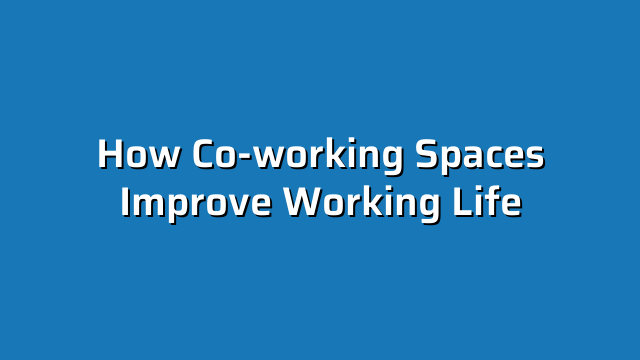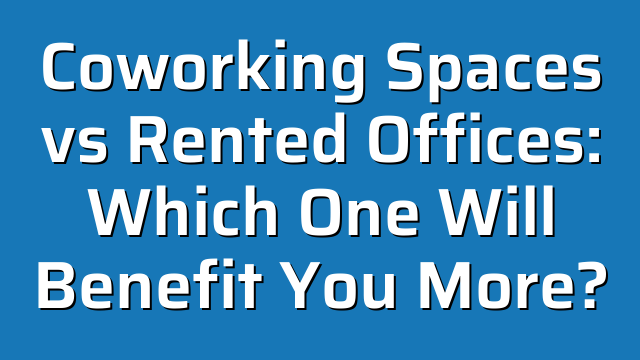Table of contents
- Introduction
- Cafes are not designed for coworking
- Lack of Necessary Amenities
- Noise Level
- Distractions
- Alternatives to Cafes for Coworking
- Conclusion
Introduction
Picture this scenario: you’re sitting in a corner booth of your favourite cosy café, sipping a delicious latte, and catching up on work. Sounds ideal, right? Now, imagine that café slowly starting filling up with other people typing on laptops, talking loudly on phone calls, and ordering another round of noisy espresso drinks. Suddenly, that peaceful café vibe is long gone, and you’re left feeling more frazzled than when you arrived. The truth is, while cafes can be great for a quick outdoor meeting or a leisurely break, they’re not suitable for long-term coworking. Here’s why:
First and foremost, cafes are not designed for coworking. They lack the necessary amenities that coworking spaces can provide, such as meeting rooms, printers, scanners, and mailboxes. Sure, some cafes may have a few outlets scattered around, but they’re often not enough to accommodate a group of coworkers, causing intense competition for power cords. Additionally, the Wi-Fi connection in cafes can be slow and unreliable, making it difficult to complete work tasks efficiently. Not to mention, cafes rarely offer collaborative spaces, leaving you cooped up at a small table with uncomfortable seating for hours.
Secondly, cafes are characterized by a high level of ambient noise, which can be distracting and disruptive to those trying to concentrate. From clattering dishes to loud conversations to a multitude of coffee grinders in action, working in a café can feel like being in the middle of Times Square during rush hour. The constant buzz can lead to increased stress levels and an inability to focus on important tasks.
Lastly, while cafes may seem like a great place to network and potentially meet new people, they’re also full of distractions that can hinder productivity. You might find yourself people-watching or engaging in small talk with strangers instead of focusing on work. Plus, cafes don’t offer the same level of control over the workspace as coworking spaces, leaving you at the mercy of varying temperatures, lighting, and background noises.
But fear not, fellow remote workers! There are alternatives to cafes for coworking, such as dedicated coworking spaces, library and study halls, and even your own home office. These spaces are designed specifically for coworking, offering a quiet environment, reliable Wi-Fi, access to necessary resources, and comfortable collaborative areas for efficient teamwork.
In conclusion, while the idea of working in a coffee shop may seem appealing, the reality is that it’s not a feasible option for remote work in the long term. The lack of necessary amenities, high levels of ambient noise, and constant distractions make it difficult to be productive. However, with alternatives like dedicated coworking spaces and home offices, it’s possible to find a workspace that’s both efficient and comfortable.
Cafes are not designed for coworking
Ah, the age-old question of whether or not cafes are suitable for coworking. Let’s cut to the chase – they’re not. Sure, they may seem like a great option for freelancers or remote workers who crave a change of scenery, but let’s take a closer look at why this simply isn’t the case.
First off, cafes are not designed for coworking. They’re designed for…well, serving coffee and snacks. The lack of Necessary Amenities is a biggie here. Limited outlet access means you’ll be fighting for an open spot near an outlet (and even then, it might not work), while slow and unreliable Wi-Fi simply can’t keep up with the demands of several people trying to work at once. Not to mention the lack of Collaborative Spaces! Catching up with co-workers or collaborating on a project? Forget it. And let’s not even get started on the uncomfortable seating.
But even if you can overlook all of that (which, let’s be real, you probably can’t), the Noise Level is another major concern. Clattering Dishes, LOUD Conversations, and Incessant Coffee Grinders create distractions that are simply impossible to ignore. A great writer may be able to tune out that stuffy noise, but I doubt that’s most of us!
And if that didn’t scare you off yet, let’s talk about Distractions. People-watching and Networking Interruptions abound, and if the general environment isn’t distracting enough, you also have absolutely no control over the space around you. You could be met with a sudden rush of customers or a loud coffee grinder at any time.
So, with all of the above in mind, it’s pretty clear that cafes aren’t the best option for coworking. Now, let’s take a look at some Alternatives to Cafes for Coworking.
Lack of Necessary Amenities
Let’s face it, the cosy ambience and delicious aromas from cafes make them an alluring choice for remote workers looking for a workspace. However, a closer look reveals that cafes are not the most suitable place for coworking.
Starting with the basics, cafes are meant for customers to enjoy their beverages and snacks, not for people to spend hours working. This brings us to the lack of necessary amenities. Most cafes have limited outlets, making it impossible to keep devices charged for extended periods. Slow and unreliable Wi-Fi further hampers productivity, making coworking a nightmare. Moreover, cafes offer no collaborative spaces, making it difficult for teams to work together. Not to mention the uncomfortable seating arrangements that can lead to aches and pains, adding to the already distracting environment.
The noise level in cafes can also be a substantial challenge for those looking to focus on their work. The clattering of dishes, loud conversations, and incessant coffee grinders can be a distraction for even the most focused worker.
Distractions are another significant obstacle to effective coworking in cafes. People-watching inaction, networking interruptions, and the inability to control the environment can disrupt one’s workflow and hamper productivity.
It is essential to find alternatives to cafes for coworking. Coworking spaces, libraries, study halls, and a home office are all excellent options for remote workers looking for a functional workspace. These spaces offer a suitable environment and amenities that cater to one’s professional needs.
Although cafes may seem like the perfect environment to get work done while enjoying a delicious cup of coffee, ultimately they’re not designed to offer the necessary amenities for effectively and comfortably coworking.
Noise Level
Ah, the sweet sound of clattering dishes, loud conversations, and incessant coffee grinders. A symphony that plays in the background of every cafe. But wait, can you focus on your work with all this noise? Probably not. It’s difficult to concentrate when you can hear the spoon scraping against the coffee cup or the heated argument happening next to you. And don’t even think about having an important call because you will be drowned out by the noise.
But hey, at least the coffee is good, right? And you get to hear all the latest gossip happening around you. So, it’s not all bad, right? Wrong. Cafes are not suitable for coworking because the noise level is beyond distracting. It’s uninspiring and demotivating.
Luckily, there are alternatives, like coworking spaces, libraries, and even your own home office. These places provide a peaceful environment that fosters productivity and concentration. So, while cafes may be great for catching up with friends or people-watching, they are not the best option for getting work done.
Distractions
Let’s face it, people watching can be fascinating, but it’s not exactly conducive to productivity. And don’t even get me started on networking interruptions – I can’t count the number of times a startup founder has tried to pitch me their latest app idea while I’m trying to get my work done.
Even when there aren’t people trying to talk to you, being in a café means that you’re constantly surrounded by activity. From the baristas shouting out orders to the clinking of glasses, it’s hard to stay focused on your own thoughts. And if you’re someone who needs peace and quiet to concentrate, forget about it.
Finally, there’s the issue of control. When you’re in a café, you have no say in what music is playing, what temperature it is, or who’s sitting near you. And while some people might thrive on the unpredictability of this environment, others find it frustrating and distracting.
So while cafes may be a great place to catch up with friends or read a book, they’re not the most effective workspace. If you’re serious about getting work done, it’s best to look for alternatives that offer a quieter, more structured environment.
Alternatives to Cafes for Coworking
While cafes might seem to be the go-to option for many, there are other alternatives out there that could be perfect for coworking. Let’s take a look at some of these alternatives.
Coworking Spaces:
For a coworker, a coworking space would be a perfect place to get down to business. These spaces provide an environment specifically designed for coworking, with enough amenities ranging from unlimited Wi-Fi access to a more dedicated workspace. The best part? The people in coworking spaces are just like you – they’re there to work. So, there’s minimal distraction and maximum productivity.
Library and Study Halls:
For a quiet and calm space, libraries and study halls are the perfect places to work. They’re designed to be distraction-free zones, with a calming atmosphere and access to resources, which could help your project. However, it’s good to note that libraries and study halls might have a specific closing time.
Home Office:
If you’re looking for a space that’s close to home and easy for you to access, then the home office is the perfect solution. You don’t have to leave home or worry if you forgot anything because everything you need is right there! However, be cautious of getting too comfortable and slacking off.
In conclusion, cafes might not be the best options for coworking as they lack essential amenities, are generally noisy, and are full of distractions. But there are other alternatives out there that offer better environments for coworking. Coworking spaces, libraries and study halls, and home offices are some of the best options that you can try out. So, if you’re looking to maximize your productivity, stay away from cafes, and give one of these alternatives a try.
Conclusion
Well, there you have it folks. Cafes may seem like the perfect spot to get some work done, but they are not designed for coworking. The lack of necessary amenities, noise level, and distractions can make it difficult to focus on work. Sure, there may be a free wifi connection and endless cups of coffee, but at what cost?
Luckily, there are alternatives to cafes for coworking. Coworking spaces offer everything from high-speed internet to collaborative spaces for meetings. Library and study halls provide a quiet and distraction-free environment, while your very own home office allows for complete control over your workspace.
So next time you’re considering setting up shop at the local cafe, think twice. Do you really want to endure the clattering dishes, loud conversations, and networking interruptions? Or would you rather have a comfortable and productive workspace designed specifically for coworking?
In the end, the choice is yours. But let’s be real, cafes are meant for sipping lattes and catching up with friends, not for getting work done.

